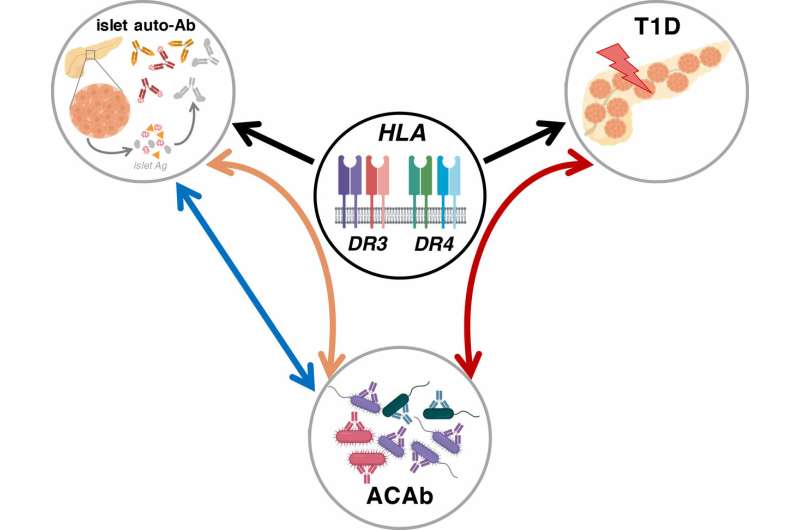February 4, 2019 report
Immune response to gut microbes may be early indicator of type 1 diabetes

A team of researchers with members affiliated with several institutions in Canada has found an association between children with a genetic disposition to type 1 diabetes (T1D) and anticommensal antibodies in their serum prior to the onset of T1D. In their paper published in the journal Science Immunology, the group describes their study of antibodies and gut microbes in children and what they found.
T1D is brought on by an abnormal immune response—for an unknown reason, the immune system mistakes beta cells in the pancreas for foreign invaders and kills them, preventing the body from making insulin for the rest of that person's life. Prior research has shown that people (usually children) who develop T1D have HLA gene variants that make them more susceptible to the disease. In this new effort, the researchers found that children with the same HLA variants also tend to react differently to bacteria in their gut biomes.
To learn more about the role of the gut microbiome in autoimmune diseases, the researchers collected serum samples from three groups of pediatric patients: those with Crohn's disease, those with T1D and controls. They incubated the serum samples with bacteria commonly found in the gut in their lab and then studied the results under a microscope. They found that patients with both Crohn's disease and T1D had higher levels of anticommensal antibodies than did the control group kids. The researchers suggest this indicates that children with autoimmune diseases have distinct gut microbiomes.
The researchers then looked into the possibility of anticommensal antibodies showing up in children before the onset of an autoimmune disease. They ran the same experiments, but the second time around, collected samples from children with the HLA gene variants but who had not developed T1D. They found that children who developed T1D and had two types of HLA gene variants were more likely to have a lower response to bacterial pools than children with the variants that did not develop the disease. The researchers suggest this indicates that an abnormal immune response may turn out to be a way to predict whether a given child with HLA gene variants is more likely to develop T1D.
More information: Alexandra Paun et al. Association of HLA-dependent islet autoimmunity with systemic antibody responses to intestinal commensal bacteria in children, Science Immunology (2019). DOI: 10.1126/sciimmunol.aau8125
© 2019 Science X Network



















